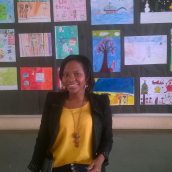Maria Atalia Matola: Exuding passion in her profession
From early on in her career, Atalia exhibited qualities of perseverance and courage toward achieving her dreams and receiving an education. Despite initially facing challenges in her plans to attend university, Atalia remained strong-willed and pursued her studies in teaching English at a teacher’s college in Maputo. The one-year intensive programme rewarded her with a teaching qualification for students from Grades 1–7 and ultimately, entrance into a university programme for English language teaching, which qualified her to teach at the secondary level as well. “After that one-year course, I realised that I really love teaching. When I get to the classroom it’s as if I’m connected to a socket. It just comes naturally – my communication with the students and delivery of the lessons,” she claims. Atalia taught for four years in both private and public schools before coming to the Academy.
During her programme at the teacher's college, she had the experience of teaching English to adults and was able to gain many skills, which she built upon and adapted during her time in Mombasa. She continues to search for new experiences and enjoys being stretched out of her comfort zone. As she has taught younger students and adults, she says, “I would like to challenge myself and teach teenagers.”
With bravery and a determined mindset, Atalia embraced the opportunity to teach at the Academy in Mombasa. Previously, Atalia was teaching at the Matolajhota school in Maputo, and frequently attended the Professional Development Centre (PDC) training and development sessions at the Aga Khan Academy Maputo, which is where she learned about the TPP. After a rigorous selection process, she was one of six individuals who were chosen to participate in the TPP.
Atalia experienced culture shock when transitioning from Maputo to Mombasa. The dressing style, the hospitality, the dominant religions and the culture are all very different from her hometown. She began to appreciate the cultural nuances and slowly adapted to the different social and cultural environments of the city, including the language. “I came to Mombasa thinking I have to work on improving my English, but I’ve also started learning Kiswahili!”
Not only was she exposed to a new culture and belief system, but Atalia also reflects upon the many lessons and skills she learned whilst in the classroom. She is always willing to grow, learn and unlearn, all in a bid to further develop her mindset and philosophy of teaching. “There are so many things that I learned here that I’m going to take in my luggage to Maputo…[especially] the inquiry-based learning, because here in the IB curriculum the student is at the centre of the learning, it’s not the teacher.” Atalia also feels that the collaborative learning approaches and the integration of the Aga Khan Academies' (AKA) Learner Profile attributes within the classroom make a large impact on the development of the child. “It makes a lot of difference…the way the students behave inside and outside the classroom really mirrors the AKA LearnerProfile.” She emphasises, “No doubt [my experience at the Academy] has made me a more effective teacher.”
Atalia has returned to Mozambique to teach at AKA Maputo. The language of instruction in Mozambique is normally Portuguese, but the Academy implements a dual-language approach and teaches in both English and Portuguese to ensure that students are fluent in both English, which is taught across the Academies network, and the language spoken in their national context. “I’m really passionate about English,” says Atalia. Many students entering Grade 1 at the Academy speak little to no English, which can make teaching in English challenging. “The main language of instruction will be English, but we’ll have Portuguese as a scaffolding language for students who don’t understand English well,” she notes.
Atalia speaks about the need for a teacher to develop a relationship with the students that goes beyond conveying information. “To be an IB teacher, you need to be someone who is passionate about your profession. You have to play so many roles apart from being a teacher…You need to be someone who is aware of the life of the student… so that you can properly guide the student.”
Having grown up in Mozambique, Atalia is looking forward to teaching at AKA Maputo, which is currently expanding its physical campus and its curricular offering to include the IB Middle Years Programme. Atalia and the other TPP graduates from her cohort will have the opportunity to bring their newly wrought skills to bear on helping to grow the school. She is embracing the challenge of nurturing the next generation of students. One of the most memorable moments of her earlier time as a teacher in Maputo was teaching young students who didn’t yet know the alphabet how to read. “It was a great moment for me to see those students opening their books and reading, joining words together, making a sentence, counting…It really touched my heart.”
Atalia has learned a great deal through the TPP but is looking forward to continuing her growth as a teacher. She says, “This course has changed me totally, no doubt. But I still want to learn more – there are so many things that are still in my mind and that I want to know how to implement. I will still learn.” Atalia also hopes to work with the PDC at AKA Maputo and share her experiences with the next cohort of teachers engaging in the TPP.
By: Karishma Bhagani and Sarra Sheikh
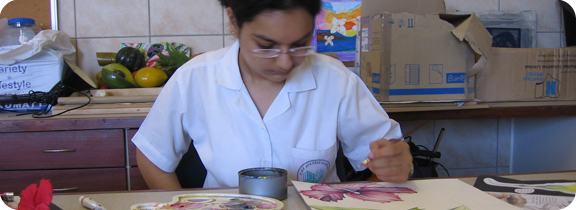
International Baccalaureate
The International Baccalaureate (IB) is a non-profit educational foundation, motivated by its mission to create a better world through education. IB programmes for students aged 3-19 help develop their intellectual, personal, emotional and social skills to live, learn and work in a rapidly globalising world.
Following in the footsteps of its sister schools in Mombasa, Hyderabad and Maputo, the Aga Khan Academy Dhaka plans to become an IB World School, subject to the necessary authorisations.
IB World Schools share a common philosophy – a commitment to improve the teaching and learning of a diverse and inclusive community of students by delivering challenging, high-quality programmes of international education that share a powerful vision.
Aims of the IB programme
Founded in 1968, the International Baccalaureate currently works with schools in 144 countries to develop and offer their programmes to over one million students.
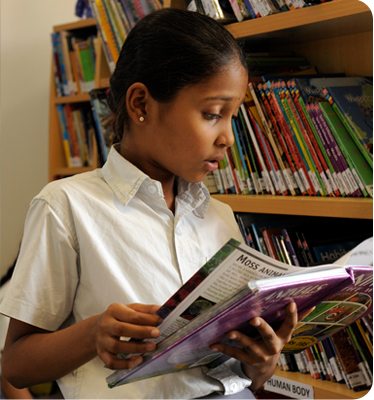 The IB mission statement declares:
The IB mission statement declares:
"The International Baccalaureate aims to develop inquiring, knowledgeable and caring young people who help to create a better and more peaceful world through intercultural understanding and respect. To this end the organisation works with schools, governments and international organisations to develop challenging programmes of international education and rigorous assessment. These programmes encourage students across the world to become active, compassionate and lifelong learners who understand that other people, with their differences, can also be right."
For further information about the International Baccalaureate and its programmes, please visit the IB website.
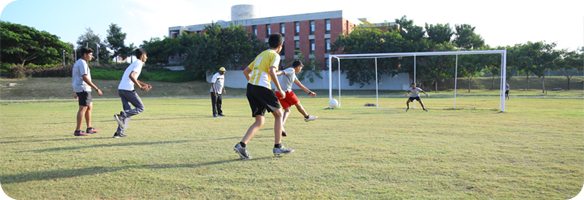
Enrichment Programme
Enrichment programmes enable students to realise their potential in a variety of settings beyond the classroom. Students develop a sense of self-awareness and an understanding of school and community needs and opportunities. They also learn how to apply their gifts and skills to make a positive impact.
At the Academy, we believe in a balanced, rounded, comprehensive school experience. As this includes both academic and co-curricular experiences, we encourage our students to do their best both in and outside the classroom.
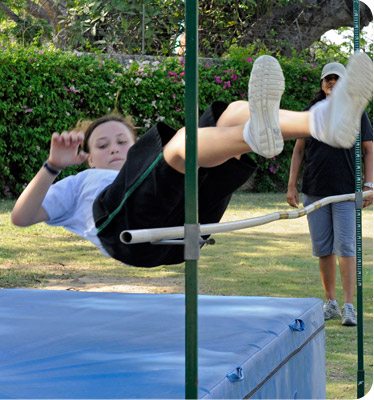 We will offer outstanding sports facilities that will include swimming and diving pools and playing fields for a wide variety of sports and athletics.
We will offer outstanding sports facilities that will include swimming and diving pools and playing fields for a wide variety of sports and athletics.
Children with special sporting gifts will be encouraged to develop their talents in every way. Children with special gifts in music, art or drama will similarly be encouraged through opportunities to practise and perform while at the Academy.
Our enrichment programmes are clustered into three main streams, each with a different focus:
Expression
Whether through visual or performing arts, this cluster engages students to think creatively and express their identities and thoughts aesthetically. Through theatre, art, music and drama, students learn to work together and infuse their projects with values and lessons from other parts of their schooling. Individual and collaborative creative projects emphasise growth and development through personal challenge, ultimately resulting in achievable personal goals.
Action
The student as a reflective practitioner is a basic tenet of the action cluster. Through physical sport, both competitive and non-competitive, students are challenged in their physical growth, and learn values such as good sportsmanship, teamwork and ethical behaviour. We encourage them to extend themselves by trying different activities and working with teammates to pass on their knowledge. In line with developing the student as a whole, a healthy lifestyle complements and enhances academic achievement.
Citizenship
At the Academy, we encourage knowledge and understanding of humanity and civil society. Through their involvement in citizenship activities, students gain an understanding of the practical implications of their work and study. By collaborating with community groups on sustainable projects, they develop an appreciation for human rights, human dignity and of how their actions impact the world around them.
To learn more about the Academy's programme, please visit the Academic Programme page.
Fatema Sheikh (Class of 2012): Advocating Educational Equality
Fatema Sheikh carries the lessons she learnt during her time at the Aga Khan Academy Mombasa with her to date.
Fatema joined the Aga Khan Academy Mombasa community in 2009 and graduated in 2012. She is currently pursuing a Bachelor of Science in consumer behaviour and marketing at the University of Reading on a full scholarship – an achievement for which she appreciates the support she received at the Academy through university counselling. She has had a colourful university career so far and hopes to graduate with her degree in the summer of 2015.
In the summer of 2013 after her first year at university, Fatema underwent a three-month internship with Champions Life Academy – an organisation which recruits and trains undergraduate students from universities to raise funds for various charities.
“This internship appealed to me, especially because it was related to my course of study as well as being able to support a worthwhile cause.”
She raised funds for a charity called Action for Blind People.
“This internship strengthened a lot of my skills, such as communication, negotiation and time management as well as improving my people skills tenfold. I am now able to approach and communicate with anybody.”
In addition to the work she did over the summer, Fatema was also heavily involved in various community activities through the university’s RED Award scheme.
Currently, she spends her time as a volunteer working with special needs children. Her desire to get involved with something like this was sparked during her time at the Academy in Mombasa. As part of her creativity, action, service (CAS) component of the Diploma Programme (DP), she spent time working with children in the special support unit of the Junior School, helping them with one-on-one or small group sessions on areas such as reading and comprehension.
“As difficult as it is, it is equally rewarding. When you get the child to enjoy what they are doing and play a part in helping them learn, it is very fulfilling.”
One situation she reflects on is her success in working with a student with several impairments, such as delayed speech, hearing impairment and a slight problem with balance.
“Helping and encouraging her made me feel like I was contributing to her understanding of various concepts," she says. "Working with children is always a two-way thing – they teach you as much as you teach them.”
In the past, she has also been involved in cultivating a garden at a school as well as volunteering at a family church in Reading during Christmas.
Fatema also places great worth on the advice she got from the Academy in preparation for university.
“My experience at the Academy could not have prepared me for life at university any better. While at the Academy, I was immersed in a diverse and multicultural environment which allowed me to adjust relatively easily to university where I was and still am constantly meeting people from different backgrounds.”
Having studied in this environment made her more open-minded and accepting of other people, and that has contributed to her being able to make friends and interact with people more easily. She also reflects on the value the International Baccalaureate (IB) DP added to her education.
“Deciding to do the IB DP is probably one of the smartest decisions I have made. I feel that the work ethic and skills such as time management required to do the programme have prepared me to take on any challenge.”
However, it was not just the academic component of the programme that pushed Fatema to stretch her limits. The DP's CAS component requires students to be actively involved in extra-curricular activities, and the theory of knowledge lessons encourages students to think critically in all disciplines. She commends both these aspects of the programme for instilling values in her that have become intrinsic to the way she lives her life.
“It made me into a more well-rounded and holistic individual,” she says. “It prepares you for life outside of school and makes you think about things that would not cross your mind or that you normally would not consider important. My ability to think and analyse situations critically has improved significantly due to constantly being challenged throughout the programme.”
Fatema has also been able to think about the time she has spent away from home and how her experience at the Academy prepared her for life in a new environment. The abundance of the AKA Mombasa alumni at the University of Reading was a part of that, and she was able to form connections quickly within the community. She also felt that the Academy offered education and opportunities just as good, if not better, than the schools in more developed places such as England, which made it very easy to transition into the unfamiliar environment.
“The Academy and the IB encourages independent thinking and this served me well since it was the first time I was living away from home for a long period and where I would have to make a lot of decisions on my own.”
A lot of Fatema’s involvement in her local community at university is inspired by the ethics she picked up at the Academy. One of the projects of which she is particularly proud is an outreach programme she conducted while interning for the Kenya School Improvement Project (KENSIP) as part of the Aga Khan Foundation internships offered to DP students at the Academy. She visited rural schools and worked with the adolescent girls there towards educating and counselling them on the day-to-day challenges faced. Initially, she focused on identifying the key issues to be tackled and then tried to come up with a way in which sensitive issues such as abuse, early pregnancy and the menstrual cycle could be approached.
“I formed a very close bond with the girls I worked with as well as their teachers. I truly felt like I helped to make a difference and taught them something worthwhile. Although I spent most of my time with the girls, I also included the boys and led forums which discussed issues such as bullying and drug abuse.”
As part of her outreach project, she worked to raise awareness in local rural communities about equal education opportunities for both boys and girls.
Fatema's commitment to providing education opportunities remains strong to this day. In particular, she feels passionate about eradicating gender inequality when it comes to education in rural parts of the world. Her work with KENSIP highlighted the need for equal education for boys and girls as the key to future development.
“It is only through education and knowledge that the current and future generations can flourish. I believe the key to breaking the poverty cycle is improving education opportunities. So, if I had all the resources at my disposal, I would advocate for the importance of the girl child being allowed to attend and stay in school.”
Aga Khan Academy Hyderabad Scholarship Programme
The Aga Khan Academy Hyderabad is launching a unique scholarship programme to attract India’s brightest young minds to join the Academy.
Up to six merit-based scholarships are on offer for outstanding boys and girls who can demonstrate superior academic ability alongside the potential to excel outside of the classroom in one or more of the following areas:
- Leadership in the service of others
- Innovation in science, technology, engineering or math
- Environmental responsibility
- Performing arts
- Team sports
Scholarships will be awarded to students from a diversity of socioeconomic, cultural, ethnic, linguistic and other backgrounds across India. Based on demonstrated merit and financial need, scholarship awards may cover up to 100% of school fees, including residential fees.
Scholarships are open to new students applying for residential admission in Grade 9 or Grade 11 in July 2025.
The process:
Students should make an application through the normal admissions process (an application fee is payable) and indicate their interest in applying for the Aga Khan Academy Hyderabad Scholarship Programme.
*This scholarship programme is open to new students only; those already enrolled at the Academy are not eligible.
- An initial assessment to determine suitability for the scholarship programme will take place.
- Shortlisted candidates will be invited for a personal interview with the Dean of Admissions. This interview will assess the ability of the student to contribute significantly to the Academy outside of the classroom.
- The final selection includes an interview with the Head of the Academy and the Dean of Admissions.
*The decision of the Academy in awarding these scholarships will be final.
Eligibility:
- To apply, students must be Indian Nationals resident in India.
- The scholarships are open to students who are able to demonstrate exceptional academic ability and the potential to benefit from a unique educational programme based on the International Baccalaureate and the Aga Khan Curricular Strands.
- Scholarships are needs-based and will take into account aspects of the financial position of the family at the time of interviews.
- Scholarship awards may not cover all costs, and some scholarships will require the candidate and their family to contribute part of the cost.
To apply or learn more about this programme, please email AKASP.Hyderabad@agakhanacademies.org
Applications will close on 31 May 2025.
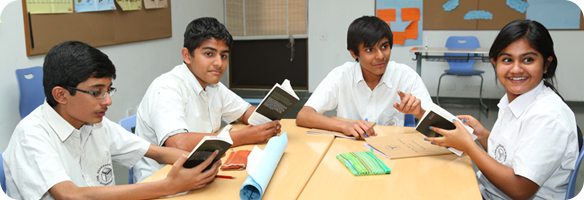
Middle Years Programme
The Senior School of the Aga Khan Academy Hyderabad is an authorised International Baccalaureate (IB) World School offering the Middle Years Programme (MYP).
We offer the IB Middle Years Programme for students in grades 6–10 as part of an integrated curriculum that includes the Primary Years Programme (grades 1–5) and the Diploma Programme (grades 11–12).
The MYP covers a study of the major disciplines, including:
- languages
- sciences
- literature
- social sciences
- mathematics
- arts
- technology
- physical education.
The five Aga Khan Curricular Strands, which are unique to the Aga Khan Academies, are integrated throughout the curriculum.
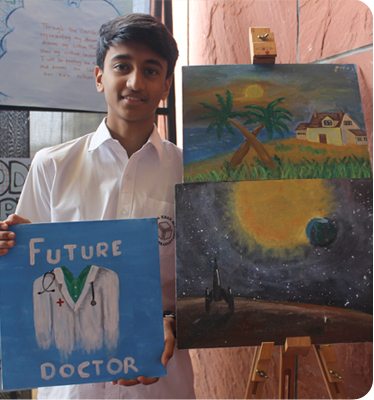 Learning through the MYP
Learning through the MYP
Our MYP students are immersed in a challenging and enriching educational environment. We ensure that they master basic skills, develop the ability to analyse and think critically, and become computer literate. We also emphasise the development of self-discipline and good work habits.
The programme encourages students to reflect on their learning and make connections with real world issues. It also helps students develop an awareness of their thought processes and learning strategies, and of how they learn best.
The MYP includes a service component that makes students aware of community and global needs. We also ensure that each student has a strong leadership experience and receives grounding in ethics, which helps prepare them for future leadership roles.
The final performance of our MYP students is assessed by teams of teachers and is validated by the IB through a monitoring process that ensures the high standards of IB schools worldwide.
MYP – grade 10 equivalence
In January 2013, the Association of Indian Universities signed an agreement with the International Baccalaureate to equate the completion of the Middle Years Programme with grade 10 of an Indian board assessment. This agreement now allows students who complete the MYP to apply for admission for higher studies to any school in India.
For further information about applying to the MYP at the Academy, please see the admission requirements or contact us.
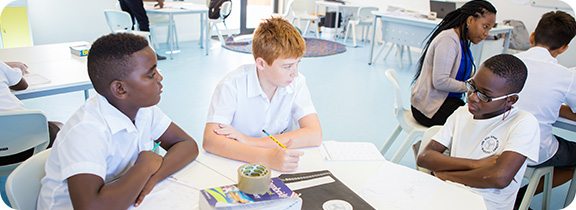
Primary Years Programme
The Aga Khan Academy Maputo has been accredited as an IB World School for the Primary Years Programme (Grades K–5).
Foundations for lifelong learning
The Primary Years Programme focuses on the development of the whole child. It is geared towards creating independent, confident and respectful learners.
 Our classroom curriculum and after-school activities address the children's social, physical, cultural and ethical development while giving them a strong foundation in all the major areas of knowledge.
Our classroom curriculum and after-school activities address the children's social, physical, cultural and ethical development while giving them a strong foundation in all the major areas of knowledge.
The curriculum consists of five essential elements:
- concepts
- knowledge
- skills
- attitude
- action.
The core subjects we cover include English language, mathematics, science and technology, and social studies. Our programme also includes a beginning computing course, physical education, music, art, French and Portuguese.
Students and teachers explore questions in all subject areas using an interactive, student-centred approach. The knowledge element of the curriculum is enhanced by six themes that are studied across the various subject disciplines. These are:
- who we are
- where we are in place and time
- how we express ourselves
- how the world works
- how we organise ourselves
- sharing the planet.
The PYP develops well-rounded students who are well versed in all areas of knowledge. They learn to be intellectually curious, principled, caring, open-minded, well balanced and reflective learners.
Please visit the Admission Requirements page or contact us to find out more about applying to the PYP at the Academy.
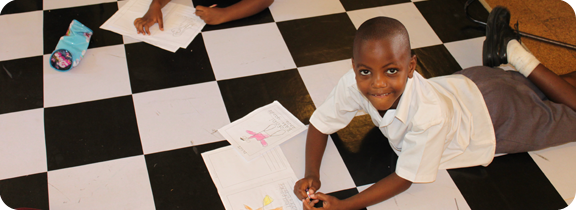
Primary Years Programme
The Junior School of the Aga Khan Academy, Dar-es-Salaam is preparing for authorisation as an International Baccalaureate (IB) World School offering the IB Primary Years Programme (PYP).
Foundations for Lifelong Learning
The Primary Years Programme focuses on the development of the whole child. It is geared towards creating independent, confident and respectful learners.
Our classroom curriculum and after-school activities address the children's social, physical, cultural and ethical development while giving them a strong foundation in all the major areas of knowledge.
 The curriculum consists of five essential elements:
The curriculum consists of five essential elements:
- concepts
- knowledge
- skills
- attitude
- action.
The core subjects we cover include English language, mathematics, social studies, science and technology. Our programme also includes a beginning computing course, physical education, music, art, French and Portuguese.
Students and teachers explore questions in all subject areas using an interactive, student-centered approach. The knowledge element of the curriculum is enhanced by six themes that are studied across the various subject disciplines. These are:
- who we are
- where we are in place and time
- how we express ourselves
- how the world works
- how we organise ourselves
- sharing the planet.
The PYP develops well-rounded students who are well versed in all areas of knowledge. They learn to be intellectually curious, principled, caring, open-minded, well balanced and reflective learners.
Please visit the Admission Requirements page or contact us to find out more about applying to the PYP at the Academy.
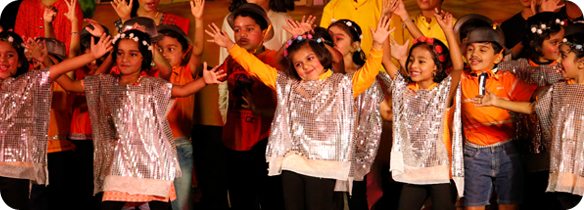
Primary Years Programme
The Junior School of the Aga Khan Academy Hyderabad is an International Baccalaureate World School and has been authorised for the Primary Years Programme (PYP).
Foundations for lifelong learning
We offer the PYP for students in grades 1–5 (aged 6–10). The programme focuses on the development of the whole child. It is geared towards creating independent, confident and respectful learners.
Our classroom curriculum addresses the children's social, physical, cultural and ethical development while giving them a strong foundation in all the major areas of knowledge.
The curriculum consists of five essential elements:
- concepts
- knowledge
- skills
- attitude
- action.
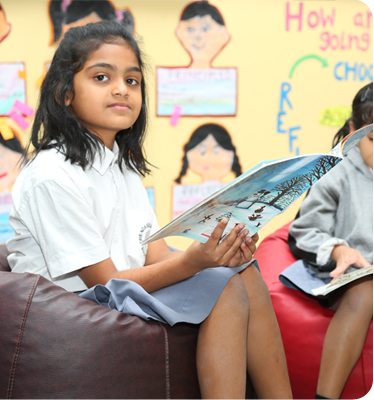 The core subjects we cover include English language, mathematics, social studies, science and technology. Our programme also includes a beginning computing course, physical education, music, art and Hindi.
The core subjects we cover include English language, mathematics, social studies, science and technology. Our programme also includes a beginning computing course, physical education, music, art and Hindi.
Students and teachers explore questions in all subject areas using an interactive, student-centred approach. The knowledge element of the curriculum is enhanced by six themes that are studied across the various subject disciplines. These are:
- who we are
- where we are in place and time
- how we express ourselves
- how the world works
- how we organise ourselves
- sharing the planet.
These transdisciplinary themes of global significance are addressed through six units of inquiry at each grade level, and this forms the school’s programme of inquiry. The programme of inquiry is the conceptual curriculum framework for the PYP. The transdisciplinary themes ensure that they are "revisited throughout the students’ years of PYP so that they are immersed in broad ranging, in-depth, articulated curriculum content” (Making the PYP Happen: A curriculum framework for international primary education).
The PYP develops well-rounded students who are well versed in all areas of knowledge. They learn to be intellectually curious, principled, caring, open-minded, well balanced and reflective learners.
Please visit the Admission Requirements page or contact us to find out more about applying to the PYP at the Academy.
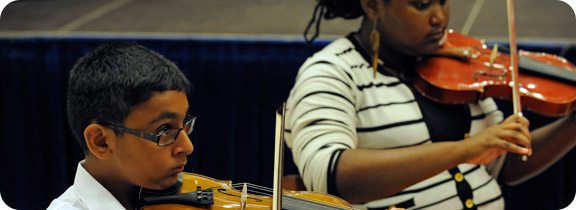
Enrichment Programmes
Enrichment programmes enable students to realise their potential in a variety of settings beyond the classroom. Students develop a sense of self-awareness and an understanding of school and community needs and opportunities. They also learn how to apply their gifts and skills to make a positive impact.
At the Academy, we believe in a balanced, rounded, comprehensive school experience. As this includes both academic and co-curricular experiences, we encourage our students to do their best both in and outside the classroom.
 We offer outstanding sports facilities that include:
We offer outstanding sports facilities that include:
- Swimming and diving pools
- Cricket, soccer and hockey pitches
- Basketball and volleyball areas
- Tennis and squash courts
- Dance studio
- Gymnasium
- Athletics tracks
Children with special sporting gifts will be encouraged to develop their talents in every way. Children with special gifts in music, art or drama will similarly be encouraged through opportunities to practise and perform while at the Academy.
Our enrichment programmes are clustered into three main streams, each with a different focus:
Expression
Whether through visual or performing arts, this cluster engages students to think creatively and express their identities and thoughts aesthetically. Through theatre, art, music and drama, students learn to work together and infuse their projects with values and lessons from other parts of their schooling. Individual and collaborative creative projects emphasise growth and development through personal challenge, ultimately resulting in achievable personal goals.
Action
The student as a reflective practitioner is a basic tenet of the action cluster. Through physical sport, both competitive and non-competitive, students are challenged in their physical growth, and learn values such as good sportsmanship, teamwork and ethical behaviour. We encourage them to extend themselves by trying different activities and working with teammates to pass on their knowledge. In line with developing the student as a whole, a healthy lifestyle complements and enhances academic achievement.
Citizenship
At the Academy, we encourage knowledge and understanding of humanity and civil society. Through their involvement in citizenship activities, students gain an understanding of the practical implications of their work and study. By collaborating with community groups on sustainable projects, they develop an appreciation for human rights, human dignity and of how their actions impact the world around them.
To learn more about the Academy's programme, please visit the Academic Programme page.
